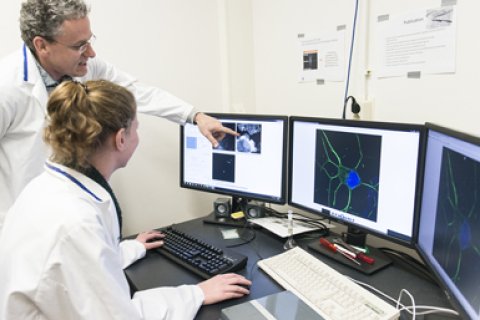Infection & Immunity
Unraveling mechanisms of infections, host defence and antimicrobial resistance

Micro-organisms are a constant challenge to human and animal health. There is a delicate balance between bacteria, viruses, parasites, and the immune system of animals and people. The increase in resistance to antibiotics poses one of the world’s major health care problems. The same applies to the emergence of novel (zoonotic) infectious viruses, such as influenza and coronaviruses, that can cause diseases.
One Health
In Utrecht, we use a One Health approach to better understand the principles underlying infection and immunity in humans and animals. This knowledge could help to develop new drugs and vaccines to protect or cure patients from (fatal) infections, and may help to find answers to the global challenges of food safety and food security.

Every day we are exposed to an immense number of pathogens trying to invade the body. How do we manage to stay healthy?
Research topics

Virology
Viruses are a major cause of disease and death in humans and animals. They are responsible for huge economic losses worldwide. We study infection, replication and spreading of several clinically important (and emerging) RNA viruses that can infect humans and animals, in particular coronaviruses, influenza viruses, and picornaviruses. Read more

Clinical Infectiology
Infections caused by resistant bacteria and parasites pose increased health risks in livestock, companion animals and humans. We investigate the emergence and spread of antimicrobial resistance in bacteria and anthelmintic resistance in parasites of animal origin. Read more

Immunology
Infectious diseases are a major burden and constant threat to the global population and economies. We focus on fundamental aspects of vaccines, innovative approaches in immuno-modulation and basic research in the cellular immunology of intracellular pathogens and infection. Read more

Infection Biology
We have co-evolved for millions of years with the bacteria in our intestinal tract. The intestinal commensal microbiota and the occasional pathogenic bacteria have great impact on intestinal health and disease. Read more

Molecular Host Defence
We focus on the innate immune system and have identified host defence molecules that neutralise or kill pathogens. These molecules can be used as alternatives to antibiotics and fungicides, and also as antivirals. They may also be used to enhance vaccine efficacy or boost animal host defence. Read more

Cell Biology
Man and animals alike employ their immune system to eliminate pathogens, infected cells, and cancer cells. We study molecular and subcellular mechanisms that play a crucial role in regulating immune responses. This includes antigen presentation, virus infections and cancer. Read more

Pathobiology
Infectious disease is caused by the interaction of pathogens such as viruses, bacteria or protozoa with their hosts, wild and domestic animals or human beings. Specific molecules originating from both the host and the pathogen determine the outcome of such interactions. Read more

Population Dynamics of Infections
We try to elucidate transmission of infectious agents in and between animal populations. We use a combination of methods to unravel transmission routes of microorganisms. This will lead to improvement of population health by optimising preventive strategies in animal populations. Read more

Expertise Centres
The One Health – Infection & Immunity programme hosts several expertise centres including the Centre for Cell Imaging, facility for Flow Cytometry and Cell Sorting, Biomolecular Interaction Facility, Veterinary Microbiological Diagnostic Centre and Dutch Wildlife Health Centre. Read more

